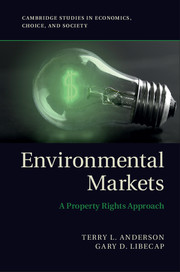Book contents
- Frontmatter
- Contents
- List of Figures and Tables
- Preface
- Acknowledgments
- 1 Who Owns the Environment?
- 2 Is Government Regulation the Solution?
- 3 Property Rights for the Common Pool
- 4 Local Property Rights to the Commons
- 5 The Politics of Property Rights
- 6 From Property Rights to Markets
- 7 Tackling the Global Commons
- 8 Property Rights and Environmental Markets
- Index
- References
8 - Property Rights and Environmental Markets
Published online by Cambridge University Press: 05 July 2014
- Frontmatter
- Contents
- List of Figures and Tables
- Preface
- Acknowledgments
- 1 Who Owns the Environment?
- 2 Is Government Regulation the Solution?
- 3 Property Rights for the Common Pool
- 4 Local Property Rights to the Commons
- 5 The Politics of Property Rights
- 6 From Property Rights to Markets
- 7 Tackling the Global Commons
- 8 Property Rights and Environmental Markets
- Index
- References
Summary
In a nutshell, this book has made the case for environmental markets based on well-defined, enforced, and transferable property rights. If all three exist, owners have an incentive to consider the full effects of their actions as they engage in Coasean bargaining to mitigate the losses of open access. Property rights – informal or formal, individual or group – help reduce the tragedy of the commons by assigning the costs and benefits of decisions, making the opportunity costs clear, limiting the race to capture rents, and allowing owners to reallocate resources across uses and across time. Property rights identify the relevant people who have a stake in the resource and who can engage in negotiation and contracting. Without them, there is little basis for bargaining. Absent exclusivity, any party can enter and compete for resource rents regardless of any agreement made by an initial group of users. Because everyone knows this potential, bargaining for environmental quality cannot gain much traction.
Property rights define expectations regarding entitlements from resource use, investment, coordination, and cooperation, relative to nonowners. They provide incentives for considering long-time horizons and for long-lasting collaboration. This certainly is necessary because most environmental and natural resource challenges involve the long term, require exclusion, and necessitate teamwork for solution. Secure property rights economize on the transaction costs of decision making, allowing market exchange, investment, and experimentation to take place quickly in response to new information regarding the environmental and natural resource asset. Given the limited scientific knowledge that often accompanies many open-access problems, the information generation and flexibility of markets are particularly critical.
- Type
- Chapter
- Information
- Environmental MarketsA Property Rights Approach, pp. 204 - 216Publisher: Cambridge University PressPrint publication year: 2014



